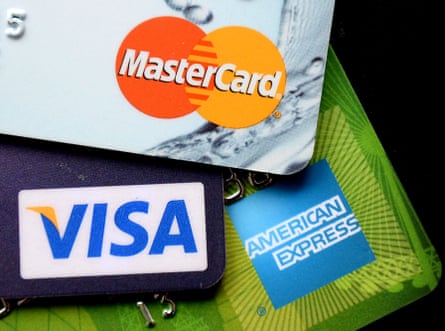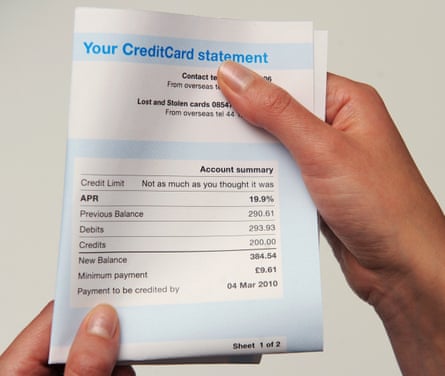There are about 58m credit cards in circulation in the UK, according to the banking body UK Finance, and many people have been making greater use of them as the cost of living crisis has continued to bite.
Used properly, a credit card can offer multiple benefits – potentially saving you money, helping your credit score and offering extra consumer protection. But, of course, there are risks involved, too.
Know when to steer clear
“If you know you won’t have the discipline to avoid overspending, you need to think long and hard about whether a credit card is right for you,” says Sarah Coles, a senior personal finance analyst at the investment platform Hargreaves Lansdown.
“Two-thirds of new clients have credit card debt when they come for advice,” says Richard Lane, the director of external affairs at StepChange Debt Charity, which helps people with debt problems take back control of their finances and their lives.
He adds that in certain circumstances, credit cards can be useful when you are faced with an unexpected expense, “but it’s not uncommon, especially during the ongoing cost of living crisis, for people to rely on credit cards when finances are tight, and then get stuck in an expensive borrowing spiral”.
 View image in fullscreenThere are about 58m credit cards in circulation in the UK, according to UK Finance.
View image in fullscreenThere are about 58m credit cards in circulation in the UK, according to UK Finance.
Photograph: Andrew Matthews/PA
If you do find yourself overwhelmed with credit card debt, or you are going to struggle with making repayments, let your card provider know as quickly as possible.
“All lenders have a regulatory responsibility to support borrowers who have fallen into difficulty,” Lane says. “They will assess your situation and may offer options such as payment breaks, reduced payments and signposting to debt advice.”
A cheaper way to borrow?
It might be, in some situations. If you pay off your outstanding balance in full each month, you won’t pay any interest on what you have borrowed, says the government’s MoneyHelper website.
If you don’t pay off the bill in full, you will be charged interest, which is usually backdated to the date of your purchase.
Find a 0% APR deal
If you want to borrow a certain amount for a specific purchase and are considering using a credit card, it is worth comparing how this would stack up against something like a personal loan. A loan is likely to have a lower interest rate than a credit card, although most banks won’t lend less than £1,000 or for fewer than 12 months, so the danger is that you may end up borrowing more than you need or can afford.
 View image in fullscreenIf you don’t pay off your credit card bill in full, you will be charged interest. Photograph: Linda Nylind/The Guardian
View image in fullscreenIf you don’t pay off your credit card bill in full, you will be charged interest. Photograph: Linda Nylind/The Guardian
Where credit cards can be useful is when they have introductory deals for new customers that can keep costs low or even at zero.
“For those looking for a new credit card, there are still plenty available that offer 0% interest on new purchases for a fixed period,” says Alex Hasty, a finance expert at the price comparison website Comparethemarket.
The risk, of course, is that you let the debt sit on the account for too long. After the 0% introductory period ends, that rate will soar – often to 30% or more. Hasty says: “If you pay your card late or miss payments, you may be charged a fee. And you may lose any promotional offers.”
Cards and your credit score
“There’s a bit of a catch-22 in that in order to get a competitive credit card – with something like a long interest-free period or a low rate – you need a good credit record. But in order to get a good credit record, you need a history of taking on debt and paying it off sensibly, which credit cards can help you get,” Coles says.
A “credit builder” card, such as Tesco Bank’s Foundation credit card, is one option that may help.
Credit cards can be a boon for credit scores and a great tactic for people building a credit history for the first timeExperian’s James Jones
These cards come with low credit limits and, by paying the debt off each month, you will begin to demonstrate that you can manage your finances.
As James Jones, a spokesperson for the credit reference agency Experian, says: “Using credit cards can be a boon for credit scores and a great tactic for people building a credit history for the first time.”
The Experian credit score operates on a scale of 0 to 999 – the higher the score, the better. “A low balance and perfect payment record can boost your Experian score,” Jones says. “But push the wrong buttons with your credit card usage, such as maxing out a card or missing repayments, and your score could suffer.”
To give you an idea, if you miss a minimum monthly payment, you are likely to lose 130 points. If you can keep your credit card balance at below 30% of your credit limit, you typically gain 90 points. Importantly, if you are considering switching between cards to chase those 0% APR deals, having a new card opened in the last six months loses you 40 points, while keeping the same card for more than five years earns you 20 points.
How to get the best life insurance coverRead more
Reap the rewards
If you are disciplined and have a reliable income, you can use a credit card for your everyday spending and make the most of incentives offered by the providers.
“You can choose between cards offering cashback [based on a percentage of the amount you spend] and those offering points that can be spent on specific things – like Nectar points, vouchers or airline or hotel points. There are also cards with fees which offer more generous returns, so you’ll need to calculate whether it’s worth it for you,” Coles says.
“Often, generous reward cards are linked to specific retailers, and give you extra points when you shop with that retailer, so when you are searching for the best option, it’s worth considering where you are likely to shop.”
For example, at the time of writing, the John Lewis Partnership credit card was offering new customers triple points on eligible spending at John Lewis and Waitrose for the first 90 days (the points are converted into vouchers).
But, Coles says: “You need to be completely honest with yourself about how you are going to use the card before you apply. There’s a risk it could end up costing you more in interest than you make in perks. The easiest way to stay on top of it is to set up a direct debit to clear the card every month. That way, it’s impossible to forget.”
 View image in fullscreenThe John Lewis Partnership credit card offers new customers triple points on eligible spending at John Lewis and Waitrose for the first 90 days. Photograph: Kumar Sriskandan/Alamy
View image in fullscreenThe John Lewis Partnership credit card offers new customers triple points on eligible spending at John Lewis and Waitrose for the first 90 days. Photograph: Kumar Sriskandan/Alamy
Get extra protection
One of the biggest advantages of using a credit card is something known as section 75 protection.
“When you buy something that costs between £100 and £30,000 using a card, the credit card company becomes jointly responsible with the retailer if something goes wrong with the purchase,” Coles says.
“It means they have a legal obligation to put things right if an item is faulty, it never arrives, or you bought it from a company that went out of business before delivering it. This applies even if you only pay for part of it on the card.”




